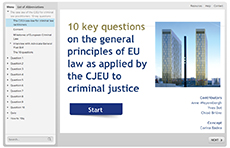
Package
- 90 minutes learning time per webinar
- Chatroom for questions, live online discussion
- Online exchange with virtual classroom experience
- High value-content: on-demand access to files (video files, audio files, documents)
- Links to all relevant sources of law
- Language: English
e-Learning course
- Three hours learning time
- Interactive quiz (essential for CPD points)
- Extensive background material
- Glossary
- Video interview
- Optimised iPad version
Speakers
Pekka Pohjankoski

Pekka Pohjankoski works as a Legal Secretary (référendaire) at the Court of Justice of the European Union in the Chambers of Judge Allan Rosas. Previously he was an official in the EU Litigation Unit of the Legal Service of the Ministry for Foreign Affairs of Finland.
André Klip

André Klip is Professor of Criminal Law, Criminal Procedure and the Transnational Aspects of Criminal Law at Maastricht University. He is a Judge at the ’s-Hertogenbosch Court of Appeal (criminal division).
Methodology
Course design
Before the webinars:
- Get started by reading the introduction to the role of the CJEU in criminal matters as well as the CJEU’s application of general principles of EU law in the field of criminal justice in the e-learning course.
- Send in your questions regarding the topic of the forthcoming webinar for the speaker to address them during the webinar presentation.
During the webinars:
- Watch the live presentation and chat with the speaker.
After the webinars:
- Read the answers to the most important questions in our blog.
Moreover:
- Read more about the CJEU’s role in criminal matters, e.g. about its interpretation of substantive and procedural criminal law and its contribution to the mutual recognition principle and fundamental rights in the e-learning course.
- Watch the webinar presentations again on video.
Three interactive webinars
The competence of the CJEU in criminal matters
Monday 3 April 2017, 16:00-17:30 hrs CEST
- Overview
- Types of actions
- Preliminary ruling and urgent preliminary ruling procedures
The latest case law of the CJEU in criminal matters
Monday 8 May 2017, 16:00-17:30 hrs CEST
- European Arrest Warrant: Halil Ibrahim Özçelik (C-453/16PPU), Bob-Dogi (C-241/15), Aranyosi and Căldăraru (C-404/15 and C-659/15 PPU) etc.
- Ne bis in idem: Piotr Kossowski (C-486/14), M (C-398/12), Spasic (C-129/14 PPU) etc.
- Detention: Emil Milev (C-439/16), Dániel Bertold Lada (C-390/16), Gerrit Van Vemde (C-582/15) etc.
- Interpretation and translation: Frank Sleutjes (C-278/126), István Balogh (C-25/15), Gavril Covaci (C-216/14) etc.
The reference for a preliminary ruling: practical advice for lawyers
Friday 23 June 2017, 14:00-15:30 hrs CEST
- How to convince the national judge to make a preliminary reference to the CJEU
- The urgent preliminary ruling procedure (PPU)
- The written observations
- The oral phase
e-Learning course
10 key questions on the general principles of EU law as applied by the CJEU to criminal justice
Access to the specialised e-learning course from 16 February 2017
- What are the general principles of EU law that the CJEU has applied in the field of criminal justice?
- How does the Court balance mutual recognition and fundamental rights in the area of criminal justice?
- How is the multi-layered protection of fundamental rights (at national, EU and CoE level) balanced in the Courts law in the area of criminal justice?
- What is the specific scope of direct effect of EU directives in national crime proceedings?
- What is the scope of the principle of interpretation in conformity with EU law?
- Which areas of substantive criminal law have been addressed by the Court?
- Which provisions of procedural criminal law have been interpreted by the Court?
- What is the contribution of the Court to the ne bis in idem principle in EU judicial cooperation in criminal matters?
- Is the accumulation of administrative and criminal sanctions for the same acts allowed under EU law?
- What is the contribution of the Court to the mutual recognition principle?

Video
Interview with Advocate General Yves Bot
Background
Since 1 December 2014, the Court of Justice of the European Union (CJEU) has full competence for the legal instruments adopted in the area of EU criminal justice. Any court can now submit a question on criminal justice matters to the CJEU under the preliminary ruling procedure, independent from a formal declaration by the Member State.
Price and Registration
Webinars and e-learning course:€ 300
Click here to register for the webinar & the e-learning course.
Only e-learning course:€ 90
Click here to register for the e-learning course.
Webinar access
Instant and easy access:
- hassle-free access with no software installation
- also accessible on iOS and Android devices